Meet Senator Marty Klyne
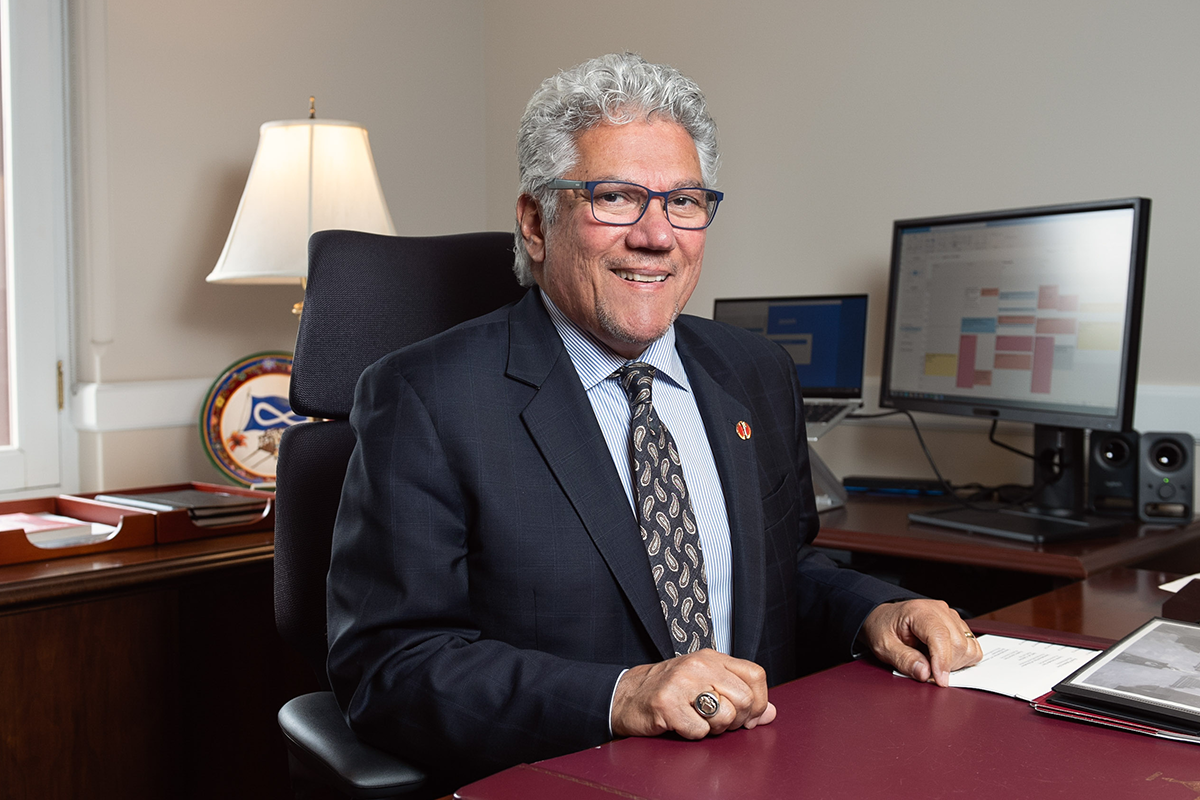
Newspaper publishing, banking, Indigenous economic development and hockey — Senator Marty Klyne has worked at the helm of all these industries, and more, in a wide-ranging executive career that earned him the nickname “Mr. Regina” back home.
In this interview with SenCAplus, the former CEO talks about his broad business experience and how it carries over to his work in the Senate.
Before your appointment to the Senate in 2018, you served in senior positions with several organizations, such as the RCMP Heritage Centre, the Regina Pats Hockey Club, and the Regina Leader-Post and Saskatoon StarPhoenix newspapers, to name a few. How have your leadership and business skills helped you navigate the Senate?
Having worked across various industries, and being a lateral thinker, I bring different perspectives that allow me to offer new and unique solutions to problems. This has been very helpful in navigating through myriad legislation proposals in the Senate. My leadership skills got me here and I feel they have been useful in my Red Chamber work. There are four leadership qualities that I subscribe to: establish a reputation for being credible, develop a forward-looking mindset, have positive energy and be competent.
I’ll never forget my first couple days in the Red Chamber when I thought, “I’m far from being the smartest person in the room.” I had to really pick up my game!
What made you want to apply to become a senator?
I thought the Senate could be a good capstone of my career, and I wanted that for my two sons and grandchildren.
I also thought joining the Senate would be a good way to give back to the country that my father served while in the Canadian Armed Forces for 25 years.
You have been a member of several Senate committees. What committee work stands out to you?
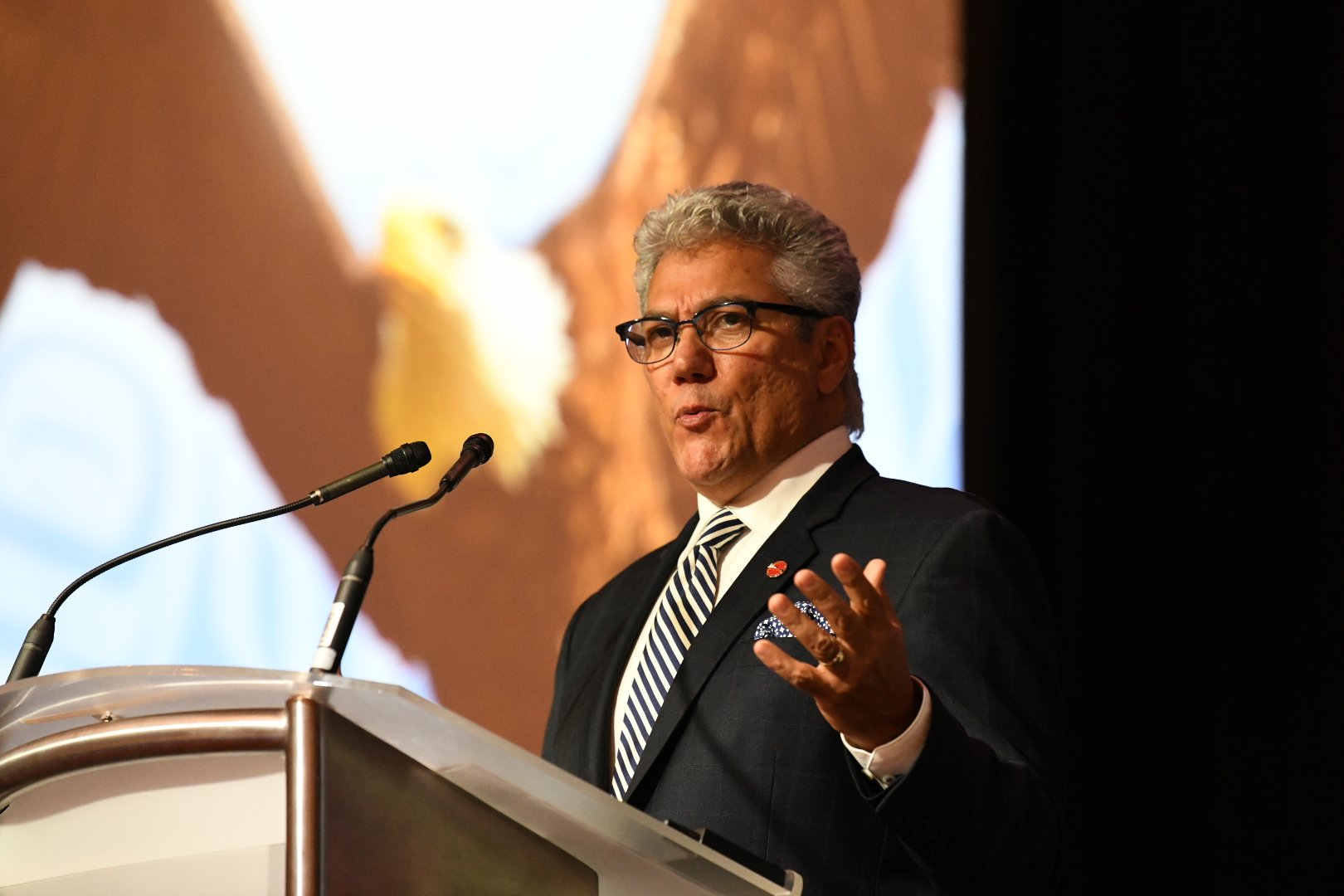 Senator Marty Klyne gives a keynote address. (Photo credit: Office of Senator Marty Klyne)
Senator Marty Klyne gives a keynote address. (Photo credit: Office of Senator Marty Klyne)
When you come to the Senate, you come to understand that a lot of work is done through committees. Then you start thinking about which committees you want to be on. The feeling is reminiscent of playing hockey on the lake, throwing your sticks in the middle and hoping your stick gets tossed in the pile of the team you want to play on.
The first two committees I joined were the Senate Committee on National Finance and the Senate Committee on Banking, Commerce and the Economy, which are both in my wheelhouse, but I ended up giving up my seats on those committees to join the Transportation and Communications (TRCM) and the Agriculture and Forestry (AGFO) committees. While serving on TRCM and AGFO, occasionally I would substitute on the Senate Committee on Legal and Constitutional Affairs (LCJC). I eventually became a member of LCJC in addition to AGFO, and I gave up my seat on TRCM. The work on LCJC has been highly rewarding, and I am especially proud of how we handled Bill S-205, which aims to protect women from intimate partner violence.
I was also asked to sit on the Standing Committee on Audit and Oversight, which is a relatively new and unique committee for the Senate. It is tasked with doing internal audits in the Senate. A lot of my skills and experiences are transferable to that committee, and later I became the chair. Throughout my career I have been on a number of boards and as CEO for a few organizations where I reported to boards and had an administrative role with internal auditors.
In addition, I was asked to join the National Security and Intelligence Committee of Parliamentarians.
You are the sponsor of Bill S-15, which would prohibit the captivity of elephants and great apes. What made you want to take up this cause?
I have an affinity for animals, and I just can’t understand neglect, abuse, or cruel treatment of an animal of any kind. I was honoured when the Hon. Murray Sinclair called me at home to tell me he was going to retire from the Senate and asked me if I would sponsor his Bill, the Jane Goodall Act.
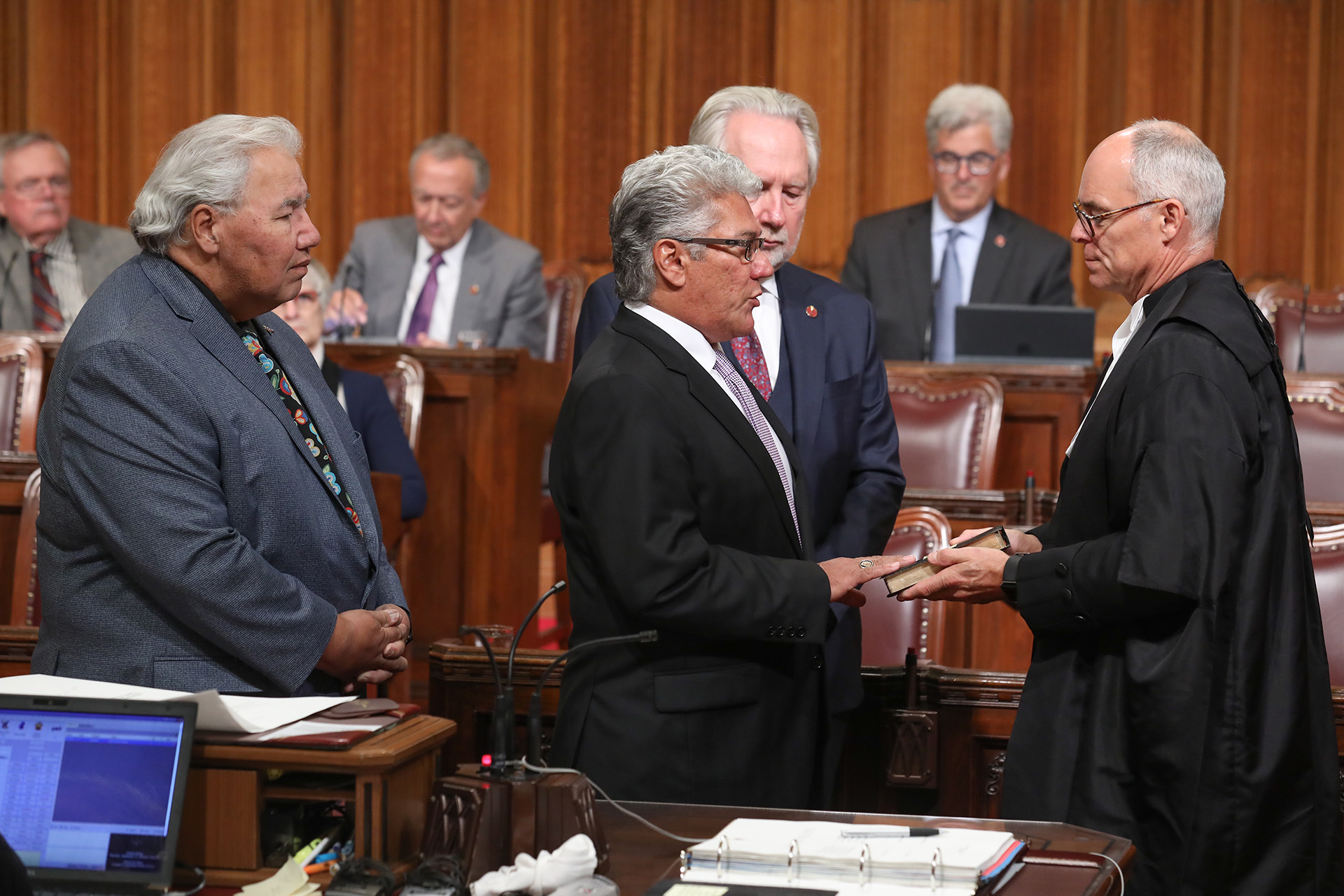 Senator Marty Klyne is sworn in during a ceremony in the Red Chamber in 2018 as former senator Murray Sinclair, left, and Senator V. Peter Harder look on.
Senator Marty Klyne is sworn in during a ceremony in the Red Chamber in 2018 as former senator Murray Sinclair, left, and Senator V. Peter Harder look on.
I accepted that in a heartbeat. That bill, S-241, has since been withdrawn. I am now sponsoring the federal government’s related Bill S-15, which aims to prohibit new captivity of elephants and great apes, unless licenced for their best interests, conservation, or scientific research, according to evidence and an independent assessment.
These sentient beings deserve legal protection. Canada can be a world leader for elephants and great apes, as we have been with our whale and dolphin captivity laws, taking our cue from science and Indigenous values of respect for nature.
You have spoken in the Senate Chamber about your Cree Métis heritage. How did you come to be aware of your rich family history?
I started building on our family tree with the help of my cousin, who already had a strong foundation for our lineage.
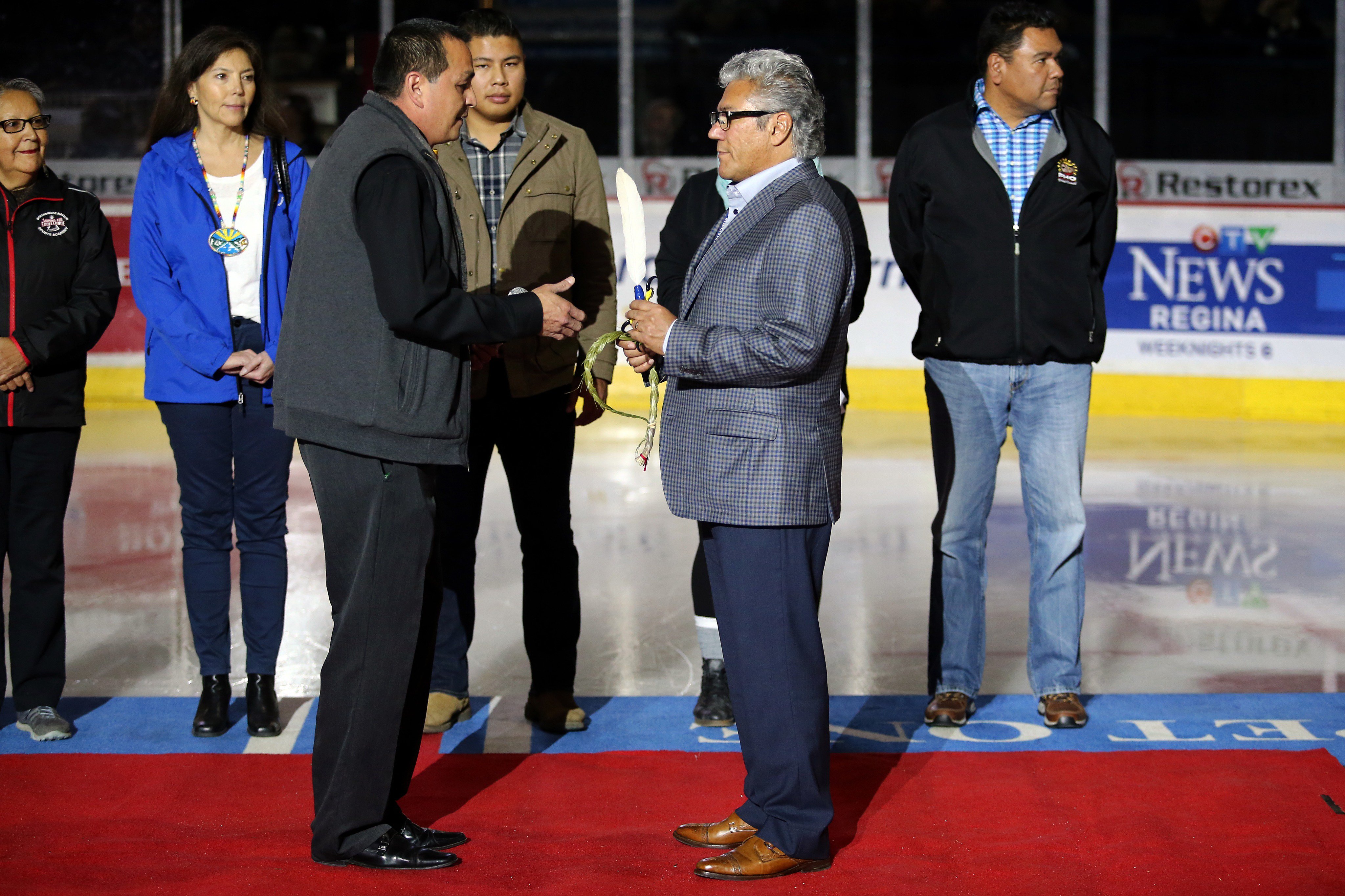 Among his many awards and recognitions, Senator Klyne received an Eagle feather from Carry the Kettle Nakoda First Nation. (Photo credit: Office of Senator Marty Klyne)
Among his many awards and recognitions, Senator Klyne received an Eagle feather from Carry the Kettle Nakoda First Nation. (Photo credit: Office of Senator Marty Klyne)
My father’s side can be traced back to Germany in 1510, back when the family name was Klein, which changed to Klyne in the late 1700s. My mother is the descendent of one of the first settlers of Regina Beach, Saskatchewan, where she grew up. And on my mother’s side, there are two lines of lineage going back to Scotland in 1710 and France in 1620.
Both sides of my family tree include generations of strong Métis and First Nations mothers. My great-grandmother was from Little Black Bear’s Band but lost her treaty status when she left the reserve and got married. And I was raised with a great deal of exposure to Métis culture and tradition.
Throughout all this lineage research, I obtained my Treaty status as a member of Little Black Bear’s Band. This was only within the past two years.
You have also praised your father, whom you described as “Clark Gable, John Wayne and G.I. Joe all rolled up in one.” How has he influenced you?
I compare my father to G.I. Joe because he was career army serving in the Canadian Armed Forces for 25 years, including active duty in the Second World War and the Korean War. I was nine years old when he retired as an Instructor Sergeant with a ten-medal set and I’ll just say that the instructor role carried on well into my late teens.
On the Clark Gable side, he was a very proper gentleman’s gentleman. His shoes were always shined and polished, and his crisp dress shirts and dapper suits were always pressed. He shined his shoes every night. Early in life I started shining his shoes and, later, my own. I still polish my shoes and iron my shirts. I have met people who could tell who I was by looking at my shoes: “Yup, you’re Lawrence Klyne’s son.”
As for the John Wayne comparison, my dad always had a steady hand on the rudder and a firm hand on the issue — he was in charge. He was also in the Royal Canadian Mechanical Engineers Electricians, so he had a lot of knowledge that he passed on to me, from repairing cars to electrical, mechanical, and carpentry. We built a couple of garages together. He built our first family home after the war and before I was born.
My mother, on the other hand, was very creative, witty and could make people laugh. She was an excellent seamstress and a great cook. She also served during the Second World War, volunteering for the Canadian Women’s Army Corps, and was decorated with a 1939-1945 Canadian Volunteer Service Medal.
Name one thing that most Canadians might not know about you.
I got my X handle @Mister_Regina from some business associates who used to call me that. I’m kind of like an old shoe in Regina — comfortably familiar and unpretentious, visible, accessible and approachable.
Except for my first job after high school and applying to be in the Senate, I never looked for a job; I was always head-hunted or tapped on the shoulder because of a recommendation by one of my colleagues. When I tried to retire in 2013, a casual conversation with an associate resulted in him calling me the next day asking me to join his organization, and I did. I needed purpose and I needed to feel productive. I have been committed to every organization that I have led, as evidenced by my track record in business, treasury boards, Crown corporations, foundations and non-profit enterprises. I have also received numerous awards and recognitions, including the Alumni Award for Distinguished Professional Achievement from the University of Regina in 2013.
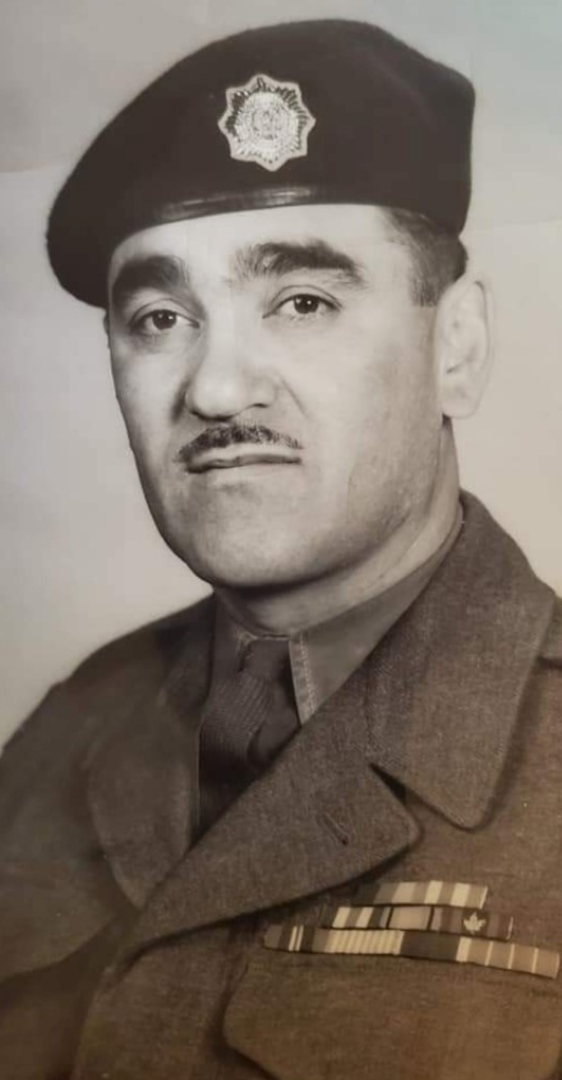 Senator Klyne described his father, Lawrence Klyne, as “Clark Gable, John Wayne and G.I. Joe all rolled up in one.” His 25-year military career spanned the Second World War and the Korean War. (Photo credit: Office of Senator Marty Klyne)
Senator Klyne described his father, Lawrence Klyne, as “Clark Gable, John Wayne and G.I. Joe all rolled up in one.” His 25-year military career spanned the Second World War and the Korean War. (Photo credit: Office of Senator Marty Klyne)
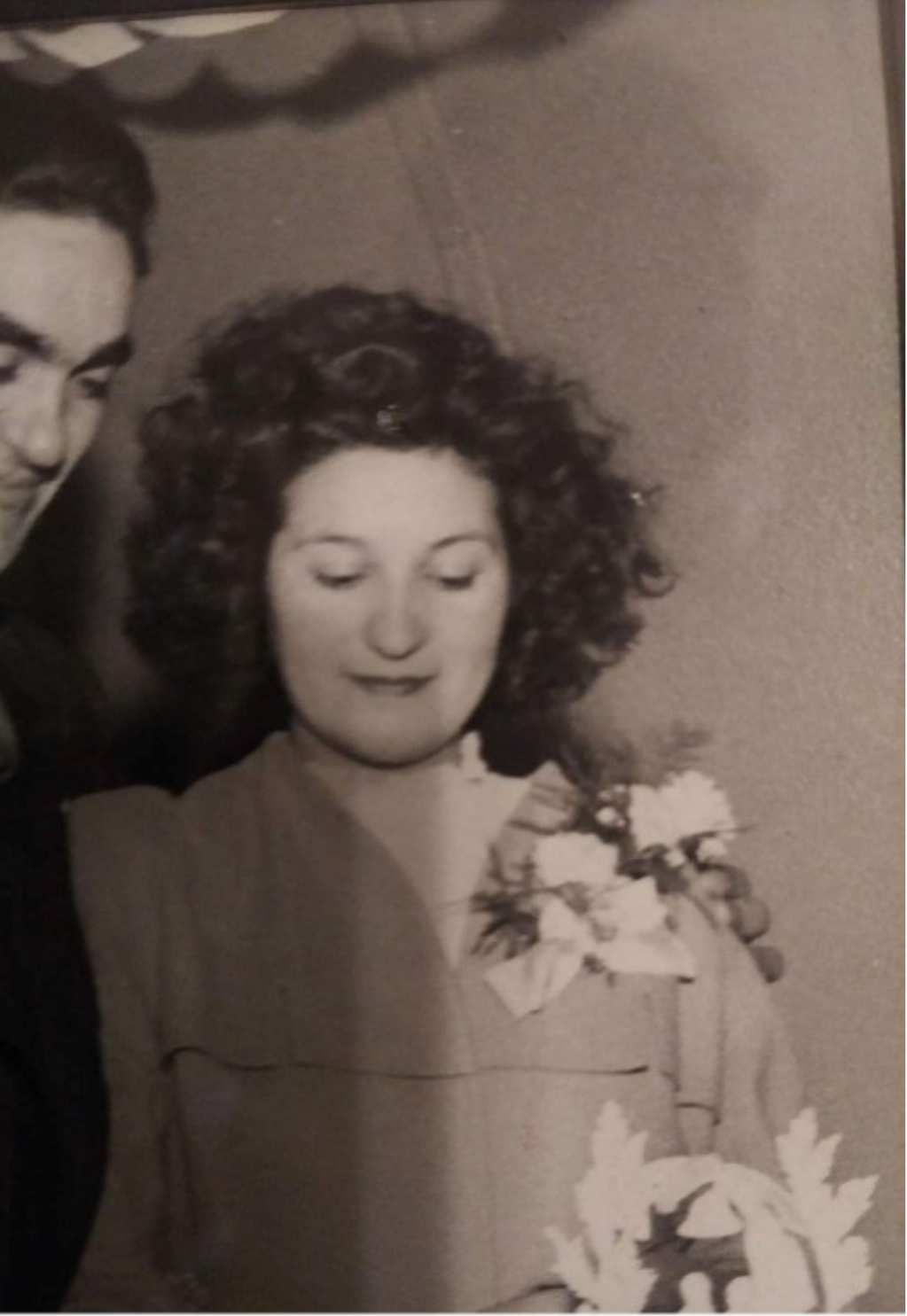 Alice Vera McKay, Senator Klyne’s mother, on her wedding day at Regina Beach. She had volunteered for the Canadian Women’s Army Corps during the Second World War and met Lawrence Klyne soon after the war ended. (Photo credit: Office of Senator Marty Klyne)
Alice Vera McKay, Senator Klyne’s mother, on her wedding day at Regina Beach. She had volunteered for the Canadian Women’s Army Corps during the Second World War and met Lawrence Klyne soon after the war ended. (Photo credit: Office of Senator Marty Klyne)
I am also a proud advocate for Indigenous economic development and honoured to have received several awards for my community work, including a First Nations blanket from former Assembly of First Nations National Chief Perry Bellegarde, and a white eagle feather from a Sun Dancer from Carry the Kettle Nakoda First Nation.
What should the rest of Canada know about your hometown of Regina?
Regina is a great place to live, work and play. We have everything. We have the opera, the symphony, the Roughriders, Regina Pats Hockey Club, excellent golf courses, good fishing and hunting, and 15 recreational lakes within a reasonably short drive. Plus, real estate is affordable. There’s a real sense of community and belonging in Regina.
It’s also a good place to raise a family. I’ve lived in the GTA and worked out of a suitcase in Calgary, Edmonton and Richmond. I’ve seen a lot of places, and wholeheartedly agree with Bob Ellard’s description of Regina as “Canada’s best little big city.”
Related articles
Tags
Committee news
Meet Senator Marty Klyne

Newspaper publishing, banking, Indigenous economic development and hockey — Senator Marty Klyne has worked at the helm of all these industries, and more, in a wide-ranging executive career that earned him the nickname “Mr. Regina” back home.
In this interview with SenCAplus, the former CEO talks about his broad business experience and how it carries over to his work in the Senate.
Before your appointment to the Senate in 2018, you served in senior positions with several organizations, such as the RCMP Heritage Centre, the Regina Pats Hockey Club, and the Regina Leader-Post and Saskatoon StarPhoenix newspapers, to name a few. How have your leadership and business skills helped you navigate the Senate?
Having worked across various industries, and being a lateral thinker, I bring different perspectives that allow me to offer new and unique solutions to problems. This has been very helpful in navigating through myriad legislation proposals in the Senate. My leadership skills got me here and I feel they have been useful in my Red Chamber work. There are four leadership qualities that I subscribe to: establish a reputation for being credible, develop a forward-looking mindset, have positive energy and be competent.
I’ll never forget my first couple days in the Red Chamber when I thought, “I’m far from being the smartest person in the room.” I had to really pick up my game!
What made you want to apply to become a senator?
I thought the Senate could be a good capstone of my career, and I wanted that for my two sons and grandchildren.
I also thought joining the Senate would be a good way to give back to the country that my father served while in the Canadian Armed Forces for 25 years.
You have been a member of several Senate committees. What committee work stands out to you?
 Senator Marty Klyne gives a keynote address. (Photo credit: Office of Senator Marty Klyne)
Senator Marty Klyne gives a keynote address. (Photo credit: Office of Senator Marty Klyne)
When you come to the Senate, you come to understand that a lot of work is done through committees. Then you start thinking about which committees you want to be on. The feeling is reminiscent of playing hockey on the lake, throwing your sticks in the middle and hoping your stick gets tossed in the pile of the team you want to play on.
The first two committees I joined were the Senate Committee on National Finance and the Senate Committee on Banking, Commerce and the Economy, which are both in my wheelhouse, but I ended up giving up my seats on those committees to join the Transportation and Communications (TRCM) and the Agriculture and Forestry (AGFO) committees. While serving on TRCM and AGFO, occasionally I would substitute on the Senate Committee on Legal and Constitutional Affairs (LCJC). I eventually became a member of LCJC in addition to AGFO, and I gave up my seat on TRCM. The work on LCJC has been highly rewarding, and I am especially proud of how we handled Bill S-205, which aims to protect women from intimate partner violence.
I was also asked to sit on the Standing Committee on Audit and Oversight, which is a relatively new and unique committee for the Senate. It is tasked with doing internal audits in the Senate. A lot of my skills and experiences are transferable to that committee, and later I became the chair. Throughout my career I have been on a number of boards and as CEO for a few organizations where I reported to boards and had an administrative role with internal auditors.
In addition, I was asked to join the National Security and Intelligence Committee of Parliamentarians.
You are the sponsor of Bill S-15, which would prohibit the captivity of elephants and great apes. What made you want to take up this cause?
I have an affinity for animals, and I just can’t understand neglect, abuse, or cruel treatment of an animal of any kind. I was honoured when the Hon. Murray Sinclair called me at home to tell me he was going to retire from the Senate and asked me if I would sponsor his Bill, the Jane Goodall Act.
 Senator Marty Klyne is sworn in during a ceremony in the Red Chamber in 2018 as former senator Murray Sinclair, left, and Senator V. Peter Harder look on.
Senator Marty Klyne is sworn in during a ceremony in the Red Chamber in 2018 as former senator Murray Sinclair, left, and Senator V. Peter Harder look on.
I accepted that in a heartbeat. That bill, S-241, has since been withdrawn. I am now sponsoring the federal government’s related Bill S-15, which aims to prohibit new captivity of elephants and great apes, unless licenced for their best interests, conservation, or scientific research, according to evidence and an independent assessment.
These sentient beings deserve legal protection. Canada can be a world leader for elephants and great apes, as we have been with our whale and dolphin captivity laws, taking our cue from science and Indigenous values of respect for nature.
You have spoken in the Senate Chamber about your Cree Métis heritage. How did you come to be aware of your rich family history?
I started building on our family tree with the help of my cousin, who already had a strong foundation for our lineage.
 Among his many awards and recognitions, Senator Klyne received an Eagle feather from Carry the Kettle Nakoda First Nation. (Photo credit: Office of Senator Marty Klyne)
Among his many awards and recognitions, Senator Klyne received an Eagle feather from Carry the Kettle Nakoda First Nation. (Photo credit: Office of Senator Marty Klyne)
My father’s side can be traced back to Germany in 1510, back when the family name was Klein, which changed to Klyne in the late 1700s. My mother is the descendent of one of the first settlers of Regina Beach, Saskatchewan, where she grew up. And on my mother’s side, there are two lines of lineage going back to Scotland in 1710 and France in 1620.
Both sides of my family tree include generations of strong Métis and First Nations mothers. My great-grandmother was from Little Black Bear’s Band but lost her treaty status when she left the reserve and got married. And I was raised with a great deal of exposure to Métis culture and tradition.
Throughout all this lineage research, I obtained my Treaty status as a member of Little Black Bear’s Band. This was only within the past two years.
You have also praised your father, whom you described as “Clark Gable, John Wayne and G.I. Joe all rolled up in one.” How has he influenced you?
I compare my father to G.I. Joe because he was career army serving in the Canadian Armed Forces for 25 years, including active duty in the Second World War and the Korean War. I was nine years old when he retired as an Instructor Sergeant with a ten-medal set and I’ll just say that the instructor role carried on well into my late teens.
On the Clark Gable side, he was a very proper gentleman’s gentleman. His shoes were always shined and polished, and his crisp dress shirts and dapper suits were always pressed. He shined his shoes every night. Early in life I started shining his shoes and, later, my own. I still polish my shoes and iron my shirts. I have met people who could tell who I was by looking at my shoes: “Yup, you’re Lawrence Klyne’s son.”
As for the John Wayne comparison, my dad always had a steady hand on the rudder and a firm hand on the issue — he was in charge. He was also in the Royal Canadian Mechanical Engineers Electricians, so he had a lot of knowledge that he passed on to me, from repairing cars to electrical, mechanical, and carpentry. We built a couple of garages together. He built our first family home after the war and before I was born.
My mother, on the other hand, was very creative, witty and could make people laugh. She was an excellent seamstress and a great cook. She also served during the Second World War, volunteering for the Canadian Women’s Army Corps, and was decorated with a 1939-1945 Canadian Volunteer Service Medal.
Name one thing that most Canadians might not know about you.
I got my X handle @Mister_Regina from some business associates who used to call me that. I’m kind of like an old shoe in Regina — comfortably familiar and unpretentious, visible, accessible and approachable.
Except for my first job after high school and applying to be in the Senate, I never looked for a job; I was always head-hunted or tapped on the shoulder because of a recommendation by one of my colleagues. When I tried to retire in 2013, a casual conversation with an associate resulted in him calling me the next day asking me to join his organization, and I did. I needed purpose and I needed to feel productive. I have been committed to every organization that I have led, as evidenced by my track record in business, treasury boards, Crown corporations, foundations and non-profit enterprises. I have also received numerous awards and recognitions, including the Alumni Award for Distinguished Professional Achievement from the University of Regina in 2013.
 Senator Klyne described his father, Lawrence Klyne, as “Clark Gable, John Wayne and G.I. Joe all rolled up in one.” His 25-year military career spanned the Second World War and the Korean War. (Photo credit: Office of Senator Marty Klyne)
Senator Klyne described his father, Lawrence Klyne, as “Clark Gable, John Wayne and G.I. Joe all rolled up in one.” His 25-year military career spanned the Second World War and the Korean War. (Photo credit: Office of Senator Marty Klyne)
 Alice Vera McKay, Senator Klyne’s mother, on her wedding day at Regina Beach. She had volunteered for the Canadian Women’s Army Corps during the Second World War and met Lawrence Klyne soon after the war ended. (Photo credit: Office of Senator Marty Klyne)
Alice Vera McKay, Senator Klyne’s mother, on her wedding day at Regina Beach. She had volunteered for the Canadian Women’s Army Corps during the Second World War and met Lawrence Klyne soon after the war ended. (Photo credit: Office of Senator Marty Klyne)
I am also a proud advocate for Indigenous economic development and honoured to have received several awards for my community work, including a First Nations blanket from former Assembly of First Nations National Chief Perry Bellegarde, and a white eagle feather from a Sun Dancer from Carry the Kettle Nakoda First Nation.
What should the rest of Canada know about your hometown of Regina?
Regina is a great place to live, work and play. We have everything. We have the opera, the symphony, the Roughriders, Regina Pats Hockey Club, excellent golf courses, good fishing and hunting, and 15 recreational lakes within a reasonably short drive. Plus, real estate is affordable. There’s a real sense of community and belonging in Regina.
It’s also a good place to raise a family. I’ve lived in the GTA and worked out of a suitcase in Calgary, Edmonton and Richmond. I’ve seen a lot of places, and wholeheartedly agree with Bob Ellard’s description of Regina as “Canada’s best little big city.”


